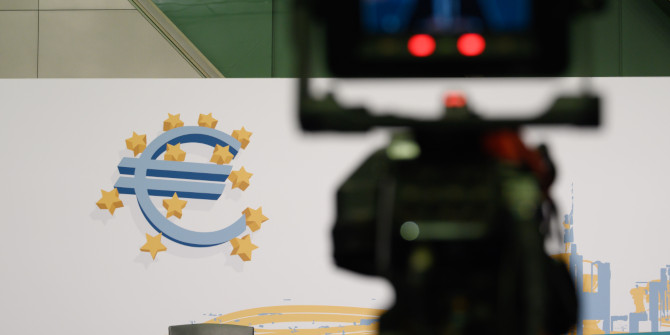The role of trade unions in climate policies is often overlooked. Drawing on new research, Adrien Thomas shows how interorganisational bargaining with companies and employers’ organisations strongly influenced European trade unions’ negotiating positions on the latest reform of the EU Emissions Trading System.
Trade unions have a sizeable presence in the high-emission sectors most impacted by decarbonisation such as manufacturing, extractive industries and power generation. In a recent study, I analysed the engagement of steel trade unions with the latest reform of the EU Emissions Trading System (EU ETS), a carbon cap-and-trade scheme that sets binding emissions reduction targets for industrial facilities, power plants and intra-EU flights. Steel producers, which account for four to seven per cent of the EU’s CO2 emissions, have been particularly vocal in arguing that tighter regulations would make them less competitive and lead to increased offshore steel production.
European trade unions have engaged with the implications of the EU ETS for steelworkers mainly at three levels: at cross-sector level through an umbrella organisation, the European Trade Union Confederation (ETUC); at sector level through the union federation IndustriAll Europe; and at company level through unionised works councillors. The ETUC and IndustriAll Europe took contrasting positions on the reform of the EU ETS and on the best way to address the issue of industrial competitiveness.
As a cross-sector umbrella organisation comprising both national union confederations and European sectoral federations, the ETUC tried to balance environmental and employment considerations, asking for stricter emission caps and a carbon border adjustment mechanism to protect European industry. With steel workers one of its key constituencies, IndustriAll Europe focused on advocating a more generous allocation of free emission allowances in order to address competitiveness concerns.
In general, interactions between the different levels of trade union action aimed at achieving a coherent position on the EU ETS were not strongly developed. Instead, interactions with external actors shaped intraorganisational bargaining processes on the EU ETS as unions entered into different lobbying coalitions targeting the relevant policymakers from the European Commission, European Parliament and member states. While the ETUC relied on input from environmental NGOs, interactions with employers’ organisations and companies chiefly influenced unions’ decision-making at sector and company-level.
A first factor explaining this prevalence of inter- over intraorganisational bargaining is the scope EU multilevel decision-making offers each trade union level to pursue its own interests. As EU multilevel governance provides multiple access points to decision-makers, the different trade union levels can pursue their interests and enter into alliances, sometimes without regard for the overall coherence of trade union policies.
IndustriAll Europe thus acted mainly in conjunction with the steel employers’ organisation, Eurofer. Both organisations issued joint position papers, press releases and letters to European policymakers underlining the need to ensure a more generous allocation of free emission allowances. With the support of trade unions and of many unionised works councillors, Eurofer also held a demonstration mobilising several thousand steel workers in Brussels in February 2016 to protest against cheap Chinese steel imports and the costs generated by the revision of the EU ETS.
The technical complexity of the EU ETS is another factor explaining the prevalence of interorganisational bargaining. Given the complexity of the legislation on emissions trading and the fact that trade unions are mainly accustomed to deal with wages and working conditions, unions may perceive alliances with employers as a means to compensate for their lack of expert knowledge and personnel. In addition, the complexity of the rules governing the EU ETS and the strong technicality of debates have a depoliticising effect, removing to a degree emissions trading from the sphere of democratic intra-union debate.
Finally, engagement in joint bargaining strategies is also related to a broader pattern of concession bargaining in the manufacturing sector in which trade unions and works councils agree to disadvantageous arrangements in the hope of maintaining employment. Trade unions have thus adopted, especially since the economic crisis of 2008, bargaining strategies aimed at safeguarding employment of unionised workers and improving company competitiveness, even if these strategies contradict general principles upheld by unions and negatively affect non-unionised groups of workers such as new hires and agency workers. Similarly, union representatives at sector and company level may come to consider climate change as a possible object of a political trade-off, where unions forsake longer-term climate objectives and industrial policy goals in favour of an alignment with employers’ short-term interests.
In the case of trade unions’ engagement with the EU ETS, the interorganisational bargaining with employers and, to a lesser degree, NGOs strongly influenced the intraorganisational priority setting of trade unions. This finding underlines the limits of unions’ capacity to elaborate independent policies on climate change mitigation. Trade union decision-making processes on climate issues need thus to be considered in the context of their interactions with employers and employers’ organisations.
To tackle the complexities of climate change, trade unions need to formulate a strategic and long-term conception of their purpose, addressing both their members’ legitimate demands for economic security and the pressing need for environmental sustainability. This in turn requires aggregating different perspectives, in particular the diversity of members’ interests and broader societal concerns over climate change, building own sources of expertise, and ensuring strong interlinkage and coordination of policy positions across the different levels of trade union action.
For more information, see the author’s open access article at Environmental Politics
Note: This article gives the views of the author, not the position of EUROPP – European Politics and Policy or the London School of Economics. Featured image credit: Daniel Larionov on Unsplash



